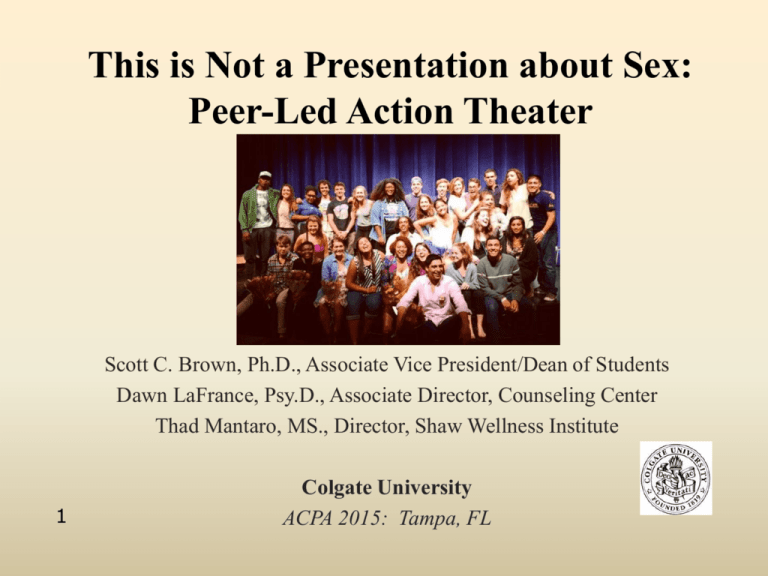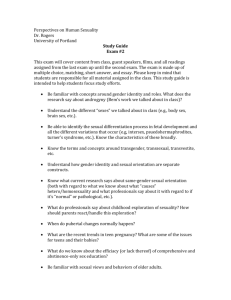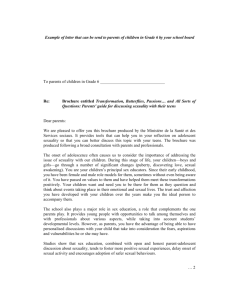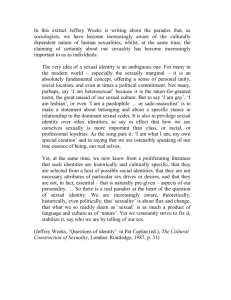
This is Not a Presentation about Sex:
Peer-Led Action Theater
Scott C. Brown, Ph.D., Associate Vice President/Dean of Students
Dawn LaFrance, Psy.D., Associate Director, Counseling Center
Thad Mantaro, MS., Director, Shaw Wellness Institute
1
Colgate University
ACPA 2015: Tampa, FL
Introduction
• How can we engage students in sexual
climate and sexual assault prevention
programming that will keep them
talking?
2
• How do we situate this conversation in
the unique social culture of our
individual campuses?
Introduction
• Incorporate positive sexuality while
empowering students
• Administrators and faculty partner with
students to effect change on campuses
• Peer-developed programs, such as “This
is Not a Play about Sex”
3
Introduction
• Reflection Question: What are the
barriers to constructive conversations
about sex and sexuality on your
campus?
4
Learning Objectives
• Increase knowledge about positive sexuality
initiatives and consider creative ways to
improve sexual climate on a college campus
• Consider how a peer-theater production or
similar program could be developed on your
campus
5
• Prepare to partner with academic colleagues
through the support and advising of student
research and academic projects
Agenda
• Sexual Climate Context and Initiatives
• Overview of TINAPAS
• Assessment
• Developing Positive Sexuality Programs on
Your Campus
• Closing/Evaluation
6
Colgate’s Sexual Climate Work
• Programming (Summit, QueerFest)
• Communication (Consent posters, Know Your
IX, Communications Department)
• Education (Bystander Intervention, YMY,
Courses & Research, Peer Health Educators)
• Policies (EGP, Trainings, NY6)
7
• Groups (Colgate’s Advocates of Positive
Sexuality, The Network)
Conceptual Framework
• “Hooking up” (Bogle, 2008)
• Positive consent and intersectionality of
identities (Friedman & Valente, 2008)
• Positive messages and general decisionmaking (e.g., DeFur, 2012; Oswalt, 2010)
• “Yes Means Yes” course (LaFrance, Loe, & Brown,
2012)
• Peer-led action theater (McMahon, Postmus,
8
Warrener, & Koenick, 2014)
“This is Not a Play About Sex”
• Themes of consent, sexual decision-making,
and healthy relationships
• Poppy Liu ‘13, senior research
with Professor Meika Loe
• The language is campus-specific,
and speaks with local and
deep authenticity
9
“This is Not a Play About Sex”
• Provocatively educates the audience
and stimulates ongoing conversations
• Social scene from a variety of
perspectives (e.g., race, gender,
sexual orientation)
10
Overview
Current student interviews
• “What does pleasure mean for you?”
• “Describe your sexual identity. Do you feel like you can
freely express it on campus?”
• “What does the perfect campus sexual climate look like in
your mind?”
11
Overview
• Interviews were translated into 20-25
monologues/short skits
• Actors of many identities and associations,
continue to facilitate the conversation on campus
12
Overview
STUDENT VIDEO
13
Administrators Partnering with
Students
• Administrators: “Behind the scenes”
• Faculty/Staff advise, coach, & support
• Involve the larger campus in this initiative
14
Assessment
• Pretest-posttest design exploring the
impact of TINAPAS on students’ thoughts
and attitudes
• Quantitative and Qualitative Feedback
• Cast and Crew Interviews
15
Assessment
• Predetermined Objectives
• The Multidimensional Sexual Self-Concept
Questionnaire (MSSCQ; Snell, 1998):
Sexual Self-Efficacy & Sexual Self-Schemata
(Likert Scales)
• > 200 sets of data, with representative
demographics
• Promising preliminary analyses
16
Assessment
• I feel able to intervene if I see
a potentially threatening
interaction taking place at a
party.
• I have considered how sexual
assault affects the LGBTQ
community on campus.
17
Assessment
And,
• I am proud of the way I deal with and
handle my own sexual desires and
needs.
• I have considered realistic ways of
transforming the culture towards a
more positive sexual climate.
• I feel supported in making changes at
that would be positive for the sexual
climate at Colgate.
18
Assessment
Qualitative Feedback: What will you do
differently as a result of watching this play?
That I will speak up more about what I want.
Approach my sex life differently, more respect
to myself.
Stay more true to my sexual values and
respect others.
19
Intervene if I see potentially threatening
interaction taking place.
Assessment
Cast and Crew Interviews
20
Big picture of sexual climate
Environment/structure affects us all
Critical lens expanding
Complex identities
Activist art (the power to shift us
emotionally)
Importance of Community
Assessment
Cast and Crew Interviews
Learned what I want, what I don’t want
Vulnerability (power in that, shared)
We are all connected/ intertwined in
decisions we make
Social support/ Safe space/ Deeper
peer relationships
21
What Could Work on Your Campus?
Do Something!
• Opportunities in student research
• Innovative student ideas
• Partner with faculty experts on
social issues
• Form group of interested students and give
time for brainstorming and creativity
22
• Delegate but advise carefully
• Collect feedback and make adjustments
Bringing it Home: What Works on Your
Campus?
THIS IS NOT A PLAY ABOUT SEX
• Contact Christina Liu for more For additional
info & rates please visit:
• www.thisisnotaplayaboutsex.com
• christina@thisisnotaplayaboutsex.com
23
• Facebook page
Conclusion
• Reflection Question: What questions
would your students and community
find meaningful about sex and sexuality
on your campus?
24
Thank You
Contact
Scott Brown: sbrown@colgate.edu
Dawn LaFrance: dlafrance@colgate.edu
Thad Mantaro: tmantaro@colgate.edu
25
References
•
Bogle, K. A. (2008). Hooking up: Sex, dating, and relationships on campus. New
York University Press: New York.
•
Breitenbecher, K. H. (2000). Sexual assault on college campuses: Is an ounce of
prevention enough? Applied and Preventive Psychology, 9, 23-52.
•
DeFur, K. M. (2012). Don't forget the good stuff! Incorporating positive messages
of sexual pleasure into sexuality. American Journal of Sexuality Education, 7, 160169.
•
ETR Associates (2007-2009). Resource Center for Adolescent Pregnancy
Prevention. Retrieved from
http://www.etr.org/recapp/index.cfm?fuseaction=pages.TopicsInBriefDetail&pageI
D=61&PageTypeID=1
•
Foubert, J. D., & Newberry, J. T. (2006). Effects of two versions of an empathybased rape prevention program on fraternity men's survivor empathy, attitudes, and
behavioral intent to commit rape or sexual assault. Journal of College Student
Development, 47, 133-148.
26 •
Friedman, J. & Valenti, J. (2008). Yes Means Yes! Visions of Female Sexual Power
and a World Without Rape. Seal Press: Berkeley, CA.
References
•
Katz, J. (1994). Mentors in Violence Prevention (MVP) trainer’s guide.
Northeastern University’s Center for the Study of Sport in Society. Boston,
MA.
•
LaFrance, D. F., Loe, M., & Brown, S. C. (2012). “Yes Means Yes”: A new
approach to sexual assault prevention. American Journal of Sexuality
Education, 7, 445-460.
•
McMahon, S., Postmus, J., Warrener, C., & Koenick, R. (2014). Utilizing peer
education theater for the primary prevention of sexual violence on college
campuses. Journal of College Student Development, 55, 78-85.
•
Oswalt, S.B. (2010). Beyond risk: Examining college students' sexual
decision-making. American Journal of Sexuality Education, 5, 217-239.
•
Owen, J. J., Rhoades, G. K., Stanley, S. M., & Fincham, F. D. (2008).
“Hooking up” among college students: Demographic and psychological
correlates. Archives of Sexual Behavior, 39, 653-663.
27








